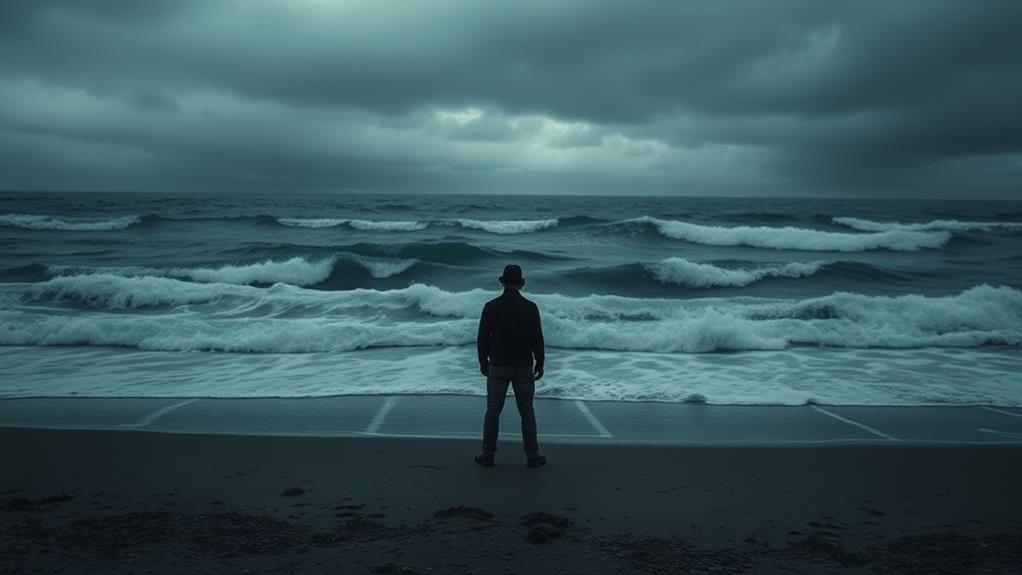In John Banville's *The Sea*, you navigate the haunting interplay of memory and grief through Max Morden's introspective eyes. His return to a seaside town prompts reflections on love, loss, and the complexities of human relationships, particularly with the enigmatic Grace family. The sea serves as a powerful symbol of beauty and danger, mirroring Max's emotional turmoil. As he confronts the pain of his late wife, Anna, you witness the fragility of identity shaped by nostalgia and mourning. Dive deeper into the narrative, and you'll uncover the layered richness of memory and its lasting impact on the soul.
Overview of The Sea
What happens when you confront the ghosts of your past? In John Banville's "The Sea," you join Max Morden, an art critic, as he returns to a haunting seaside town from his childhood. This journey isn't just a trip; it's an exploration into his memory, where grief over his late wife, Anna, intertwines with reflections on love and identity.
As you navigate Max's recollections of summers spent with the Grace family, particularly the twins Chloe and Myles, you feel the weight of loss and the complexity of human relationships. The narrative explores the essence of human experiences as Max grapples with his past choices and their enduring impact on his present.
The novel unfolds in two parts, revealing Max's initial bravado that masks his inner turmoil. Yet, as you read on, you witness a poignant introspection that exposes the fragility of his psyche.
The sea itself becomes a powerful symbol, embodying both beauty and danger, mirroring Max's emotional landscape. Through Banville's lyrical prose, you investigate themes of mortality and the persistence of memory, making you question how these elements shape your own identity.
"The Sea" isn't just a story; it's a meditation on what it means to confront your past and the ghosts that linger within.
Themes of Grief and Memory
Grief permeates every page of "The Sea," shaping Max Morden's journey as he navigates the turbulent waters of memory. His reflections on his wife Anna's death intertwine with childhood memories, revealing how deeply grief impacts identity and sense of self.
As you read, you can feel the weight of loss, especially when Max confronts the concept of a "second death," where fading memories signify a deeper trauma for the living. This exploration of trauma and recovery resonates with the stories of resilience shared by women who've faced their own adversities, highlighting the transformative power of healing through personal stories.
The connections he shares with the Grace twins, particularly Chloe, provide a lens to examine his past traumas and desires, illuminating the fragile interplay between love and loss.
Banville masterfully captures the tension between nostalgia for what once was and the painful realities of present grief. The sea, a central symbol, mirrors the ebb and flow of these memories, illustrating both the beauty and danger of revisiting the past.
Through Max's journey, you witness the complexities of mourning, where each wave of memory brings reflections that shape his understanding of life, love, and the lingering shadows of grief.
The narrative invites you to confront your own connections to loss and the haunting nature of memory.
Character Analysis: Max Morden

One might say that Max Morden embodies the complexities of human emotion, as he grapples with the dualities of sensitivity and cruelty throughout "The Sea." His character is intricately woven from threads of isolation and regret, particularly in his relationship with his late wife, Anna. Their bond, marked by a lack of true intimacy, forces him to confront his grief and the emotional weight of loss.
This exploration of personal growth and resilience mirrors the themes found in literary classics like David Copperfield, where characters are shaped by their struggles against adversity.
Max's childhood memories, especially those involving the Grace twins, serve as essential touchstones for his self-identity. They illuminate how first love shapes adult relationships and complicates the quest for self-expression. As he revisits these memories, you see him wrestling with the ghosts of the past, revealing the fragility of identity amidst the inevitable passage of time.
His struggle underscores a broader theme—the tension between remembering and forgetting. The interplay of grief and memory creates a haunting landscape where Max's relationships are defined not only by his experiences but also by the absence of what could have been.
In maneuvering through these complexities, Max Morden emerges as a poignant reflection of the human condition, marked by the enduring scars of love and loss.
Literary Style and Structure
John Banville's "The Sea" captivates readers with its lyrical prose and intricate structure, crafting a rich tapestry of emotional depth.
You'll find that Banville employs a non-linear style, weaving together various timelines that reflect the fluidity of memory, much like Tita's journey in female empowerment. This approach not only enhances the narrative but also deepens your understanding of Max's character.
Here are some key elements of his literary style:
- Lyrical Beauty: The writing flows with a musicality that engages your senses.
- Lush Descriptions: Vivid imagery paints the internal and external landscapes, immersing you in Max's world.
- Complexities of Grief: The narrative exploration of loss reveals the fragility of identity, prompting you to reflect on your experiences.
- Childhood Memories: Banville draws on past recollections, connecting them to present emotions and enriching the story's texture.
Through this rich literary texture, Banville invites you to grapple with the delicate interplay of memory, grief, and the symbolism of the sea, making "The Sea" not just a story, but an experience that lingers long after the last page.
Symbolism of the Sea

The sea in "The Sea" is a powerful symbol that encapsulates the duality of beauty and danger, mirroring Max's emotional struggles and longing for the past. Its vivid, painterly descriptions evoke both awe and foreboding, reflecting the unpredictable nature of life.
As you embrace the idea of transformation and resilience, you can see how the sea embodies memory and loss, becoming a backdrop for Max's reflections on grief and identity. personal growth is essential as he navigates through his memories; the sea transforms, much like his emotions, reminding you of the transient nature of existence.
You can't help but notice how the cyclical tides reinforce the themes of transformation and the inevitability of loss. Just as the waves crash and recede, Max's experiences ebb and flow, illustrating the ongoing battle between nostalgia and the harsh realities of life.
The sea, in all its beauty and danger, prompts you to confront these complexities. It embodies the interplay between memory and existence, urging Max—and you—to acknowledge the permanence of loss while also embracing the possibility of renewal. In this way, the sea becomes more than just a setting; it's a profound symbol of life's complexities.
Conclusion
In the end, you realize that while Max Morden's journey through grief and memory might seem bleak, it's oddly comforting. The very sea that represents loss also cradles the possibility of healing. Ironically, as he immerses himself in sorrow, he discovers that facing the past can lead to unexpected clarity. So, as you close the book, you're left with the bittersweet truth: sometimes, to move forward, you must first dive deep into the waves of remembrance.



